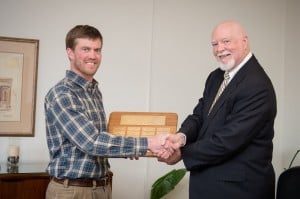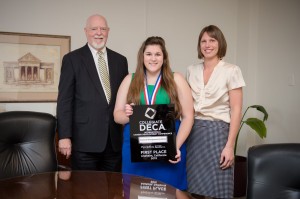
HOUGHTON, MI (08/07/2013)(readMedia)– James Trethewey, an Ironwood native, was recently honored at the Michigan Technological University Alumni Reunion. Trethewey, a 1967 alumnus in business administration, received the Distinguished Alumni Award, presented to alumni “who have made outstanding contributions both in their careers and to Michigan Tech over a number of years.”
Trethewey began his career with Copper Range and soon joined Cleveland-Cliffs (now Cliffs Resources), advancing through management positions over the years. From Ishpeming to Ontario to Cleveland, he worked in positions of increasing responsibility and became vice president-controller and chief accounting officer. Along the way, he also earned his MBA from Baldwin-Wallace College.
In his final years with Cliffs, Trethewey was senior vice president of business development and worked with the senior corporate team in reshaping the company, adding international experience to his career. He was a member of the American Mining Association, the Society of Mining Engineers, and other organizations, retiring in 2007.
For Michigan Tech, he’s been on the Advisory Board for the School of Business and Economics since 1994 and has served as a trustee for the Michigan Tech Fund. He and his wife have funded the James and Dolores Trethewey Applied Portfolio Management Program (APMP) Professorship, given to APMP creator Dean Johnson, and have supported students through scholarships.
Since his retirement from Cliffs, Trethewey has remained active in social, business, and industry activities. He serves on the board of two charities, participates as a member and CEO of the limited partnership DJD Investments, and is a board member of Steel Dynamics Inc., a major US steel producer, where he also serves as chairman of the Audit Committee.
Michigan Technological University (www.mtu.edu) is a leading public research university developing new technologies and preparing students to create the future for a prosperous and sustainable world. Michigan Tech offers more than 130 undergraduate and graduate degree programs in engineering; forest resources; computing; technology; business; economics; natural, physical and environmental sciences; arts; humanities; and social sciences.



